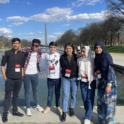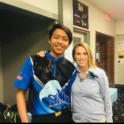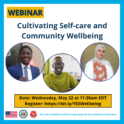Muskan, a student from Pakistan, discusses her experience attending Civic Education Week.
STORIES
Africa Region Innovation Camp

As part of the Kennedy-Lugar Youth Exchange and Study alumni program, iEARN and IRIS hosted the Africa Region Innovation Camp in Cameroon for YES alumni from Tanzania, Ghana, Mali, Senegal and Cameroon. This workshop was hosted in Yaoundé, Cameroon from November 16-21, 2014.
 The Africa Region Innovation Camp was designed with the special intent of enabling YES alumni to spot assets around their communities and empower them to create and implement their own solutions to pressing problems. The Camp dove into the human centered design and innovation process, and explored a wide range of processes and tools in order to develop new, innovative and local solutions to problems in local communities. During the workshop, YES alumni were introduced to tools they can use to increase their level of creativity when coming up with project ideas, as well as the methods and tools needed to put these ideas into action. As an integral part of this process, YES alumni improved their collaboration, project management and public speaking skills as they worked in teams to develop an action plan for their innovation and learned how to pitch it to an audience.
The Africa Region Innovation Camp was designed with the special intent of enabling YES alumni to spot assets around their communities and empower them to create and implement their own solutions to pressing problems. The Camp dove into the human centered design and innovation process, and explored a wide range of processes and tools in order to develop new, innovative and local solutions to problems in local communities. During the workshop, YES alumni were introduced to tools they can use to increase their level of creativity when coming up with project ideas, as well as the methods and tools needed to put these ideas into action. As an integral part of this process, YES alumni improved their collaboration, project management and public speaking skills as they worked in teams to develop an action plan for their innovation and learned how to pitch it to an audience.
After two days of engaging workshops on the Human Centered Design Thinking (HCDT) process and Asset Based Community Development, alumni began identifying opportunities latent in their communities that could be used to solve some of the issues most important to them. Participants formed six teams by selecting a topic they felt passionate about, and spent the next two days developing their social ventures. This process involved creating a business canvas based on a lean start up model, doing market research and prototyping. After an intensive session on idea pitching, teams stood in front of a panel of judges to pitch their innovation.

 The trainers and staff were all incredibly impressed at how these young people from both rural and urban communities came together to explore new possibilities for community development. The groups, which were made up of participants from different countries, worked diligently together. Despite being from diverse areas, through close, collaborative teamwork, the groups were able to identify problems that applied to each of their communities. They continued to cultivate their projects by utilizing each other’s strengths. The groups were forced to assess their leadership skills when they were given challenging tasks with short deadlines. However, by the end of the camp, each group had developed an innovative solution to a local problem and charted out an action plan for implementation. The following is a brief description of the six ventures that were pitched.
The trainers and staff were all incredibly impressed at how these young people from both rural and urban communities came together to explore new possibilities for community development. The groups, which were made up of participants from different countries, worked diligently together. Despite being from diverse areas, through close, collaborative teamwork, the groups were able to identify problems that applied to each of their communities. They continued to cultivate their projects by utilizing each other’s strengths. The groups were forced to assess their leadership skills when they were given challenging tasks with short deadlines. However, by the end of the camp, each group had developed an innovative solution to a local problem and charted out an action plan for implementation. The following is a brief description of the six ventures that were pitched.
Education for All
Nelly Gyebi, Yassir Mbarouk, Seynabou Camara, Ibrahim Asiagodo, and Larissa Essombe Ndoutou
This group aims to improve education in rural areas by collecting education materials and selling them to people in need at an affordable price.
Finko
Ndeye Maty Tall and Adams Issaka
Finko aims to help rural communities become safer and better connected by harnessing solar power into lamps that can charge cell phones.
MIW Tags
Serigne Baytir Dieng, Miriam Laizer, and Fatima Mohammed
In order to protect the environment, MIW Tags aims to create plastic recycling programs in communities. They will then use the plastic they collect to make products like backpacks, shower caps, and umbrellas.
Unemployment Bulldozers
Safeh Evangeline Bekemeh, Josiane Lele Mokam, and Stephane Kamtchuing Fodjo
This group aims to decrease unemployment by making information about job openings more available with SMS job alerts and matching organizations with qualified job seekers.
The Health Agents
Faraja Ng’ida, Fily Coulibaly, and Clementine Noubosse Pafoule
The Health Agents will improve local health by using local materials such as Citronella plants to prevent diseases like malaria.
Say No To Trash
Mahaitou Maiga and Said Abbas
Say No To Trash aims to mitigate environmental issues by using local materials to build trash cans, providing them to communities, and educating the communities on the importance of utilizing the trash cans.

“I have gained more confidence from this camp. I was always scared to start a project or to do anything by myself, but now I'm ready to go for it.”

“This experience has been literally life changing. And this is not an exaggeration or a flower throw. It's like I am looking at everything with a new vision and in different angles. I have never gone this far into a project, but now I actually think that I can do this, I have the skills and the tools necessary. I feel like I have people I can count on to give me feedback and to help me through all the processes and I have gained so much in self confidence. I don't see myself as a change-wisher because, let's face it, every one can be that; I see myself as an enabled change maker and that is all thanks to this Innovation Camp!”
View videos on the YES Vimeo account. Photos from the event can be viewed on YES Flickr.





